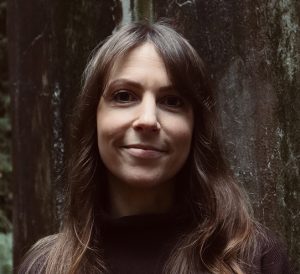Dr. Alex Berry is a SSHRC Postdoctoral Fellow at UBCO’s FEELed Lab, where she is supervised by Dr. Astrida Neimanis. Alex’s research is titled, ‘Uncommoning sense: Feeling a changed climate in early childhood teacher education’.
Alex’s postdoctoral research seeks to knot early childhood pedagogies with the feminist environmental humanities, toward new ways of ‘sensing’ uneven, everyday climate realities in the early years. Centering the FEELed Lab’s commitment to climate and social justice as deeply entangled pursuits, her project engages early childhood education students in attuning to how particular bodies sense and feel climate change in particular places. In response to the expansive overwhelm of climate catastrophe discourse in BC, Alex’s project uses small, artistic experiments to question the ‘common sense’ ways we think children experience nature.
“As many early years scholars have argued before me, early childhood education has been characterized by colonial and neoliberal ideas of humans as bodies that sense the world in rational and autonomous ways. Early childhood’s persistent pedagogical reliance on visual ways of knowing, and a dependency on developmental psychology’s ‘5 senses’ (as individual, intrinsic, and divided) are a few examples of this. Children with magnifying glasses in hand setting out to discover the wild unknown, and the ‘freedom’ of children’s sensorial fun getting messy outdoors are all-too-familiar images that reinscribe a settler colonial view of the world.”
Alex suggests that these prevailing understandings of the senses in early childhood produce educational practices that separate children from the damaged worlds they inherit. She hopes that her research might make a modest contribution to the ongoing efforts of early childhood scholars who are trying to shift these conditions – specifically, Alex’s work is interested in thinking alongside early childhood education students in re-imagining the senses for times of pressing environmental precarity. Through artistic and embodied methods, she is exploring how early childhood pedagogies might approach human sensoria as intercorporeal, and embedded with non-human networks.
A central focus of Alex’s project has been the creation of an experimental, online and place-based course for pre- and in-service educators across BC, titled ‘Sensing a changed climate in early childhood’. The course is curated around a series of ‘micro’-workshops, invited speakers, and on-the-ground experiments for ‘uncommoning’ the senses. Alex shares how curation of the course experiences has involved many rich ‘behind the scenes’ collaborations; “The course itself has emerged from a deeply collective and cross-disciplinary labour with researchers, community-members, and artists at UBCO’s FEELed Lab, the Faculty of Critical and Creative Studies, the Faculty of English and Cultural Studies, and Capilano University’s Centre for Research in Childhood Studies. Envisioning and creating the course alongside people from fields beyond my own has generated an incredibly hospitable ground for pushing early childhood’s disciplinary framings beyond its status quo. I am extremely inspired by (and grateful for!) the generous intellectual spaces these dialogues have afforded.”
The course launches this May, and will be followed by a virtual exhibition of student processes and an open-access archive of anti-colonial, arts- and place-based teaching resources.
About Alex Berry
Alex obtained her Ph.D. in Curriculum Studies with the Faculty of Education at Western University on Anishinaabek, Haudenosaunee, Lūnaapéewak and Chonnonton Nations lands. Within postqualitative framings, Alex’s research puts into conversation research-creation and pedagogical inquiry toward anti-colonial early childhood pedagogies that respond to 21st century ecological crises. This orientation has energized her pedagogical work in early childhood spaces in North and Latin American contexts, as well as her curatorial work in two international exhibits, Disorientating the early childhood sensorium: Micro-interruptions for alternative climate futures and Plastic childhoods: Noticing toxic intra-dependencies in Andean early childhood.
